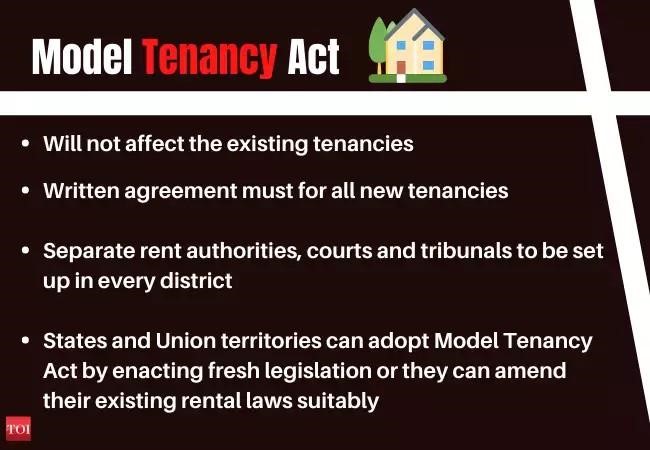The union cabinet, on June 2, 2021, approved the Model Tenancy Act. The draft law, which is expected to revolutionize the rental real estate market in India, was approved in a cabinet meeting chaired by Prime Minister Narendra Modi. The approved law will now be circulated to states and union territories, for adaptation by way of enacting fresh legislation or amending existing rental laws suitably.
As we already knew Center cannot make law behalf of the State under Article 246 of our Indian Constitution. As West Bengal concern it already has West Bengal Premises Tenancy Act 1997. Many states believe it will collide the State Law (List II of seventh schedule) and Center Law making power behalf of state in concurrent list (List III of seventh schedule), Such notion arises in Model Tenancy Act 2021.
Important features of the Model Tenancy Act:
(1) As per the new act, landlords will now be able to take a security deposit (rent paid in advance) of maximum two months of residential premises and six months in case of non-residential premises, respectively. The security deposit amount differs in every city.
(2) Before entering the rented premises, the property manager or landlord has to serve a notice, in writing or through electronic mode, to the tenant at least 24 hours in advance under the given circumstances: a) to carry out inspection; b) to carry out replacement or repairs or to get any work done or to do any work; c) for any other reasonable cause mentioned in the tenancy agreement.
(3) According to the act, if a tenant fails to vacate the rented place on the expiration or termination of tenancy period even after the landlord fulfills every condition mentioned in the agreement, then the landlord can double the monthly rent for two months and four times after that.
(4) Landlord never cut the power and water supply of the tenant in whatsoever scenario. This is usually seen in landlord do in tenancy disputes.
(5) The Model Act establishes a three-tier quasi-judicial dispute adjudication mechanism consisting of: (i) Rent Authority; (ii) Rent Court; and (iii) Rent Tribunal. No civil court will have jurisdiction over matters pertaining to provisions under the Model Act.
(6) Rent Authorities and Rent Courts may be established by the District Collector with the approval of the state government. The state or union territory government may establish a Rent Tribunal after consulting with the jurisdictional High Court.
(7) Time-bound and robust grievance redressal mechanism comprising the rent authority, the rent court, and the rent tribunal to provide fast-track resolution. Disposal of complaint/appeal by the rent court and the tribunal within 60 days.
Note: Till Now it’s mainly depend on state decision whether to adopt the Model Tenancy Act or not.

